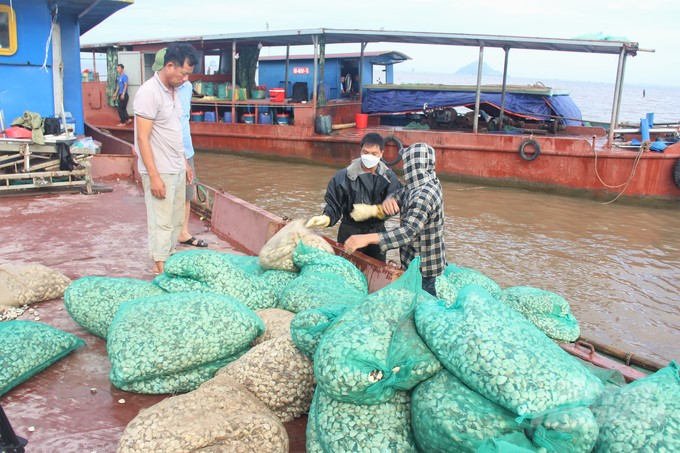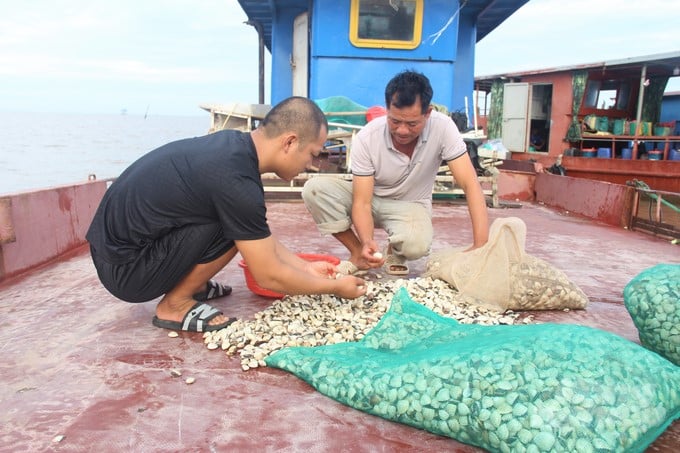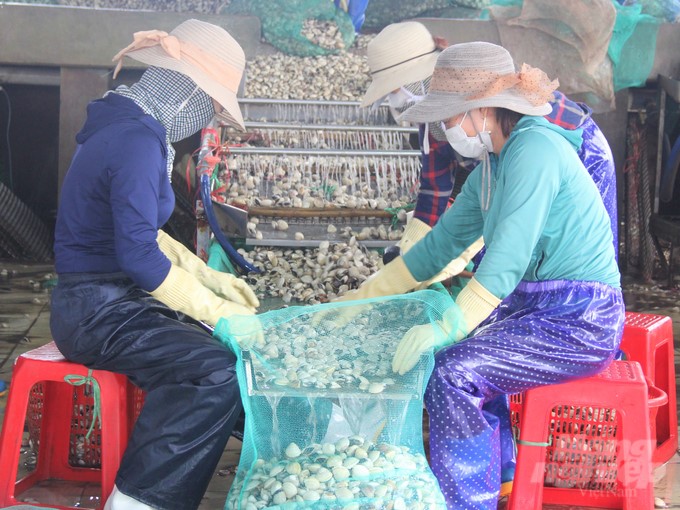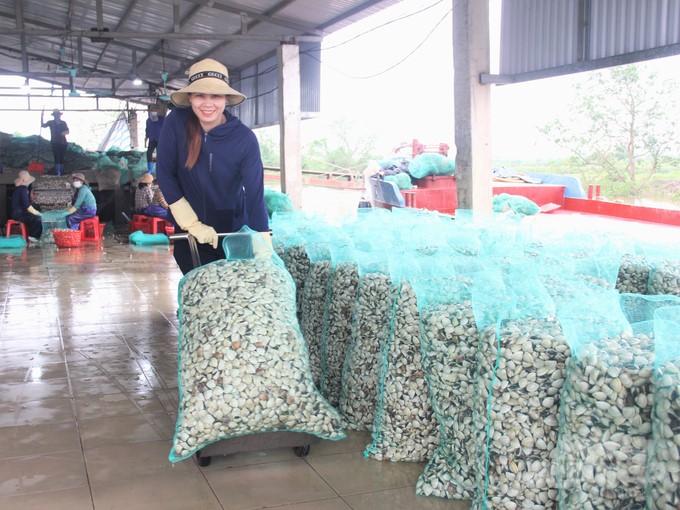May 22, 2025 | 12:55 GMT +7
May 22, 2025 | 12:55 GMT +7
Hotline: 0913.378.918
May 22, 2025 | 12:55 GMT +7
Hotline: 0913.378.918

In 2022, the raw clam farming area of Kim Son district (HASUVIMEX-associated farming area) was certified to meet the standards of the Aquaculture Stewardship Council (ASC). Photo: Trung Quan.
Currently, Kim Son district (Ninh Binh) has over 1,200 ha of commercial clam farming with an output of nearly 30,000 tons/year and more than 300 clam hatcheries. The clam farming profession in the coastal alluvial area of Kim Son district has significantly contributed to improving the income and living standards of people and contributing to the locality’s socio-economic development.
However, in the early years of development, clam products from Kim Son district were mainly consumed in the domestic market and exported unofficially to China, so the selling price was unstable, especially during the complicated development of the COVID-19 pandemic.
Faced with that reality, with the support of the International Collaborating Centre for Aquaculture and Fisheries Sustainability (ICAFIS) and the Research Center for Resource and Rural Development (RECERD), since 2020, the Ninh Binh Department of Agriculture and Rural Development has cooperated with Thanh Hoa Fishery Import Export JSC (HASUVIMEX) and clam farming households in Kim Son district to implement the project "Associating clam chains according to ASC in Ninh Binh province".
In 2022, the raw clam farming area of Kim Son district (HASUVIMEX-associated farming area) was certified to meet the standards of the Aquaculture Stewardship Council (ASC) by the Control Union organization, with a certified area of 839 ha.
ASC is an international standard for sustainable aquaculture established by the World Wide Fund for Nature (WWF) and the Sustainable Trade Initiative (IDH) to manage global standards for responsible aquaculture. Certification according to ASC standards is a confirmation that seafood is raised responsibly, minimizing adverse impacts on the environment, ecosystem, and community, and well ensuring labor regulations.
Mr. Tran Kien Cuong, Deputy Director of Kim Son Clam Cooperative, shared that the issuance of ASC certification for the commercial clam farming area of Kim Son district and the maintenance of this certification are not easy tasks because of the ASC’s extremely strict process of inspection, evaluation, and supervision. In particular, the clam farming area is required to ensure three basic principles: legal operation and effective business management; operating in an environmentally responsible manner; and operating in a socially responsible manner.
"When conducting the assessment, experts from international organizations went directly to the clam farming area to thoroughly check all indicators (farming environment, clam seed, stocking density, harvest time, harvesting labor, etc.). After that, they invited each clam farming household to meet, discuss, and interview; any unclear content will be examined in the end. Only when having enough basis will the expert group agree with the authorities and Kim Son District People's Committee to set up landmarks, mark the location, and attach the location of the ASC clam farming area on the map," said Mr. Cuong.

Clam farming households in the ASC-certified area must strictly comply with regulations on farming environment, clam seed, stocking density, harvest time, harvesting labor, etc. Photo: Trung Quan.
Especially, the certification is valid for 3 years (valid until September 13, 2025), so every year, foreign experts will not give notice and suddenly come to check directly at the clam farming area to obtain the most objective assessment. Therefore, if the farming households do not strictly comply with the set requirements, the risk of having their certificates revoked is very high.
"ASC-certified clam products are very favored by consumers in many markets around the world, especially the European market. Therefore, ASC certification is a good opportunity for the Kim Son clam to be exported to many countries around the world. Thereby, both affirming the Kim Son clam brand and helping farming households expand the consumption market, raise the selling price, and increase profits," said the Deputy Director of Kim Son Clam Cooperative.
Ms. Le Thi Thoa, a trader specializing in buying Kim Son clams for consumption in the Southern provinces, shared that Kim Son clams in general and clams in the ASC-certified area in particular are always highly appreciated by the market for quality and mode. Clams raised in the ASC-certified area have bright shells, high uniformity on the head, stoutness, and sand cleanliness, so traders and consumers always compete to buy them all.
Mr. Tran Kien Cuong, Deputy Director of Kim Son Clam Cooperative, added that, since being issued ASC certification, all clam farming households have agreed to implement production (how to clean the farming areas, where to buy seeds, stocking density, etc.), harvesting method, and consumption according to a unified process. Thanks to this, since November 2022, the cooperative has sold to HASUVIMEX more than 3,000 tons of commercial clams, with the company’s committed buying price for clams in the ASC-certified area always VND 500/kg higher than clams outside the ASC area.

Members of the Kim Son Clam Cooperative pre-process clams before selling them. Photo: Trung Quan.
Mr. Vu Minh Hoang, Deputy Director of the Ninh Binh Sub-Department of Fisheries, said that the Ninh Binh Department of Agriculture and Rural Development has advised the Provincial People's Committee to issue Plan No. 165/KH-UBND dated October 7, 2022, on the implementation of the scheme on developing marine aquaculture in Ninh Binh province to 2030, a vision to 2045.
This plan aims to promote the province’s potential and advantages to develop marine aquaculture in general and clam farming in particular in the direction of goods, synchronous, efficient, sustainable, and ecological environment protection; create branded products that meet market requirements; promote marine economy development; and increase people's income. In particular, the province sets a target that by 2025, the clam farming area will reach 1,500 ha, with an output of 35,000 tons and 100 billion clam seeds.

The selling price of clams in the ASC-certified area is always VND 500–700/kg higher than outside. Photo: Trung Quan.
To do this, the Provincial People's Committee has directed the Kim Son District People's Committee and related units to plan the concentrated clam breeding area, encourage farming facilities to upgrade equipment, and apply scientific and technical advances to production to create quality seeds.
In addition, strengthen the inspection, examination, supervision, and strictly handle violations in the production and circulation of clam seed and materials for clam farming; well implement the program of environmental monitoring and warning to promptly notify farmers.
Regarding production organization and management, it is necessary to establish cooperatives and boards (groups) to manage farming areas; strengthen the role of community management to support each other in technical work, logistics, and product consumption.
Especially, maintain a strict monitoring program to ensure that, in the coming time, the province's clam farming area will maintain ASC certification. At the same time, continue to expand the clam farming area that meets ASC standards and ensure sufficient supply for the domestic market and export.
Translated by Huyen Vu Thu

(VAN) The draft amendment to the Circular on rice export trading stipulates a periodic reporting regime for rice exporting enterprises.

(VAN) Dong Thap farmers attained an average profit margin of 64% during the summer-autumn 2024 crop (first season), while An Giang and Kien Giang farmers followed with 56% and 54%, respectively.

(VAN) As a doctoral student doing research on renewable energy and electrification at Harvard University, the author shares his musings on electricity, nature, and countryside memories.

(VAN) The decree on Extended Producer Responsibility (EPR) ensures transparent management and disbursement of support funds, avoiding the creation of a “give-and-take” mechanism.

(VAN) Hue City rigorously enforces regulations regarding marine fishing and resource exploitation, with a particular emphasis on the monitoring of fishing vessels to prevent illegal, unreported, and unregulated (IUU) fishing.

(VAN) Hanoi People's Committee has issued a plan on reducing greenhouse gas emissions in the waste management sector with 2030 vision.

(VAN) Vietnam's draft amendment to Decree No. 156 proposes a mechanism for medicinal herb farming under forest canopies, linking economic development to population retention and the sustainable protection and development of forests.